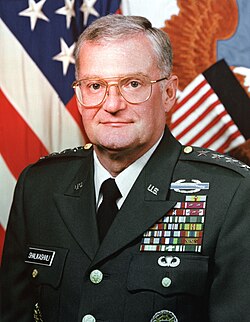
The list of Elliott School of International Affairs people includes notable graduates, professors, and administrators affiliated with the Elliott School of International Affairs of the George Washington University, located in Washington, D.C.
Contents
- Alumni
- Journalism
- Diplomacy
- Law
- Politics
- Economics
- Business
- Military
- International organizations
- Scholars
- Other
- Faculty
- Scholars and researchers
- Diplomacy 2
- Politicians
- Economics 2
- Military 2
- Journalism 2
- International organizations 2
- Other 2
- See also
- References
Among its alumni are numerous ambassadors, diplomats, politicians, and public figures, including Chang Dae-whan (former prime minister of South Korea), Tammy Duckworth (sitting U.S. senator), Rose Gottemoeller (current deputy-general of NATO), Ciarán Devane (current chief executive of the British Council), and John Shalikashvili (former Supreme Allied Commander). Notable faculty has included Christopher A. Kojm, chairman of the National Intelligence Council under President Obama, Moudud Ahmed, former prime minister of Bangladesh, Amitai Etzioni, former president of the American Sociological Association, William J. Crowe, former chairman of the Joint Chiefs of Staff, and S. M. Krishna, Foreign Minister of India.














